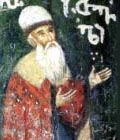RUSUDAB NISHNIANIDZE # 13
ONE IMAGE OF POETIC EXPRESSION IN GEORGIAN WRITING OF THE BEGINNING OF XX CENTURY
The Georgian thinking of XX century included lots of extraordinary and interesting topics. Each "code" is different from the ordinary means of expression. Each artistic image provides great possibility of its outstanding realization. Surely it includes certain risk too but the free creative process considers just this, does not it? This language of culture in terms of XX century includes certain criteria of system of observations. I mean the common trend (or the common mentality).
In II millennium before Christ the state was established in Mesopotamia. The name of state in Acadian language meant "the God's Gate". Later this centralized kingdom of vast territory having the common legislation became the "legend" of education, of religion. Babylon - real town, Babylon - mythical town. Though this town was given some contrast definition too: "The God scattered them (the people) from there around the whole earth and they ceased building of town and tower. That is why it was called Babylon, as just here the God mixed the languages of the whole earth". (The Bible 1989: 20)
In XX century (A.D.) the names of two towns came to the surface in the consciousness of Georgian writer (poet) simultaneously and connected to each other; the highlighted parallels: Tbilisi - the capital city; Tbilisi - the defeated city; Tbilisi - defeated by the enemy; Tbilisi - Babylon. This is not so called "rewriting of events". The space is modified in certain historical context and thus the epoch and environment where these artistic texts are created are very important.
The real name turned into the mythical one. There is just one step from particular to general. At the beginning of the XX century the magic of the names became not only the subject of discussion but quite often it used to turn into the form of actual artistic results as well. Sometimes it was very interesting and unusual as the private persons changed their first names and last names; Besides, sometimes this or that name used to become general indication. This kind of art was once called "Magic of Names" by Valerian Gaprindashvili. He also regarded it as the "great tool" for achieving the artistic goal. According to the author "the aim of the poetry is to prove and intensify the invented or existed names" (Gaprindashvili 1990: 528). What does the word "intensify" mean? I believe it means that the used name should be organically perceived in the texts and in the space as well. It is the adoption. The following concepts were distinguished as the general ones: Birnam forest, Saakadze, Tsitsamuri, Gipel, Macadam, Ashordia, Kaldea, Babylon; But what can we call this: phantasmagoria, worship of myth or simply the joking:
Nowadays the lyrics is "swinging on a swing of names" (ibid: 529).In 1921 Shalva Carmeli's poetic collection with the title "Babylon" was published in Tbilisi ( Carmel 1921: 17). Grigol Robakidze gave the question "Does Tbilisi listen to its fate silently or does the town see?! It is Babylon too, is not it?! (novel "Skin of Snake") (Robakidze 1989: 217). It is not so rhetoric question.
This topic acquires the possibility of interesting interpretation in Georgian emigrant writing too. It equally concerns the cycle of poems that Giorgi Gamkrelidze wrote in America (Scientific Historical litearry collection 1955: 14), the collection of letters ("Georgian Spirit") published by Mindia Lashauri in Munich (Lashauri 1961: 35) and others. In literary texts published abroad one more additional meaning appears: "God's Gate" - and everything is fabulous here: the light, the beauty, the love. Being far away from the native land acquires much more ideal charm and the writings become a lot more charged in emotional terms. There is nothing unusual in it. The selected artistic form provides the emigrant poets and writers with great possibility of self-expression.
And about the writings published in Georgia again. Titsian Tabidze makes attempt of modifying the space: from Babylon to Caucasia; the river Babylon - the river Mtkvari; He provides it in poems and in prose too (Tabidze 1966: 118, 307).
One more different intellectual and different thought. "We sorrowfully cry at our tombs and more bitterly we cry more we feel the love of these tombs like the captivated Jewish people cried at the river banks of Babylon, more bitterly they cried, more they felt their lost freedom" (Tabizde 1989: 223) - pain of Galaktion Tabidze ("Dear Tombs") and parallel - devastated Jerusalem by Nabucodonosor II and so called "Captivity of Babylon". The twenties and the country with lost independence.
While conducting research a number of authors and numerous interesting literary texts were distinguished. There is no play with "metaphors". Each of them includes clearly realized thought and important ideas. In general, considering the myth, historical reality or artistic esthetics the viewpoint of every specialist of culture is important and is worth of paying attention. The wide viewpoints of Georgian artists highlight numerous important "images" ("God's Gate", the echo of disordered, devastated town and the nation with lost freedom).
At the beginning of the XX century a number of samples of poetic expression got included in the field of interest of Georgian literary critics.
Bibliography:
The Bible 1989: The Bible, Patriarchy of Georgia, Tbilisi 1989
Carmel 1921: Carmel Sh. Babylon, Tbilisi: 1921
Gaprindashvili 1990: Gaprindashvili V. Poems, long poems, translations, essays, letters from the archive of the writer, Tbilisi: "Magic of Names", "The new in Georgian poetry of 1922", 1990
Lashauri 1961: Lashauri M. "Georgian Spirit", Munich: 1961
Robakidze 1989: Robakidze Gr, "The Skin of Snake", "Palestra", Tbilisi: 1989
Scientific Historical Literary Collection 1955: Scientific Historical Literary Collection "The Fate of Kartli", N20, IX, Paris: 1955
Tabidze 1966: Tabidze T, The essays in 3 volumes, Volume 1, Tbilisi: 1966
Tabidze 1989: Tabidze G. The essays in two books, The Book II, Tbilisi: 1989
 |

